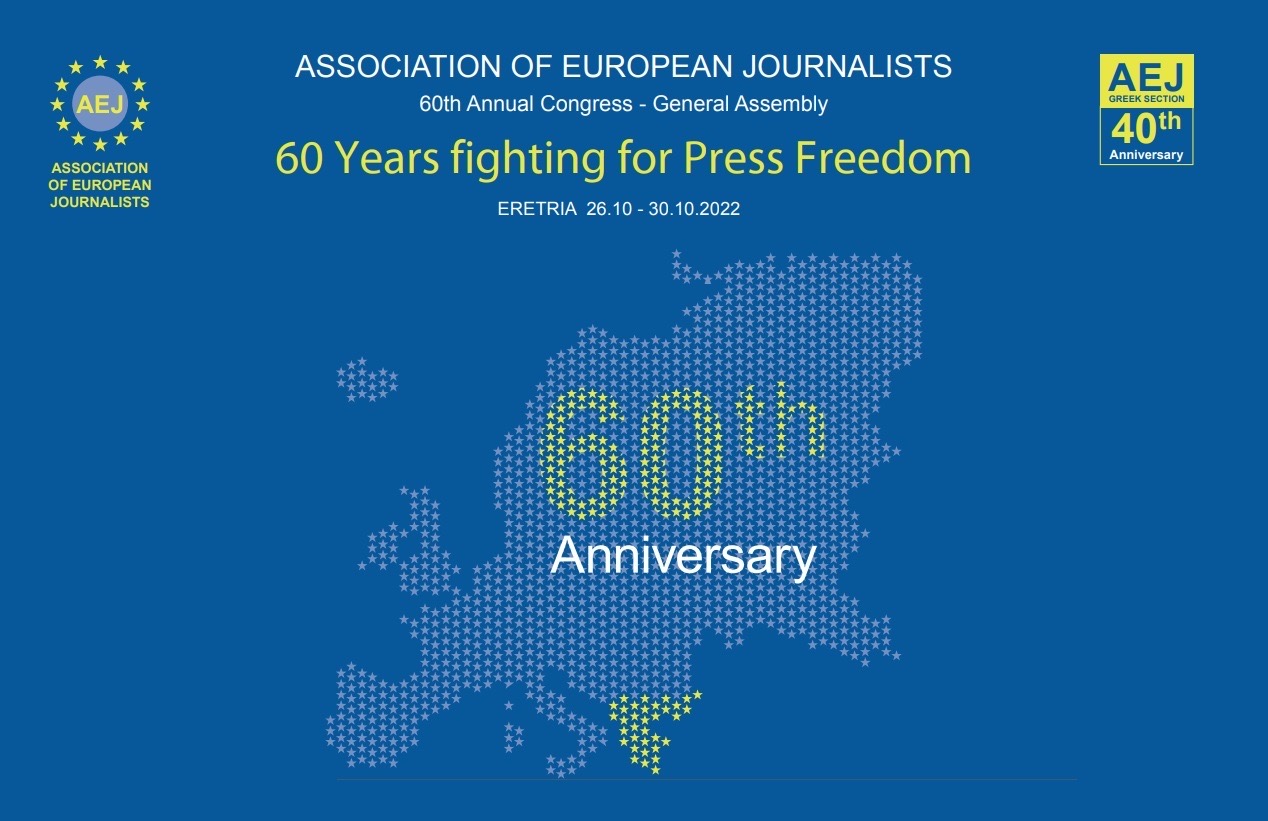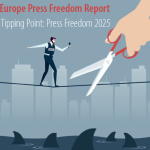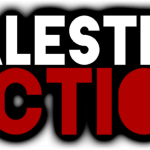Preserving and extending media freedom has never faced greater challenges, and collaboration between professional journalists and international bodies committed to defending democracy and the rules-based world order is going to be more important than ever in that battle, writes David Worsfold.
This was one of the central messages of the Association of European Journalists’ congress and general assembly in Eretria, Greece, which celebrated 60 years since the AEJ was founded and 40 years of the Greek section. Around 100 journalists from 17 countries attended the two day event.
The congress opened with a video message from Vera Jourová, Vice-President and Commissioner for Values and Transparency of the European Commission, in which she paid tribute to those journalists who “sacrificed their lives to expose corruption and crimes”.
She explained how the EU’s Media Freedom Act (MFA) would help strengthen the free and independent media by embracing three core principles: ensuring the safety of journalists, ending “abusive legal actions” and promoting diversity of ownership free of state interference.
The MFA also incorporated stronger provisions to help journalists protect their sources, although she added that this came with “responsibilities”, saying journalists must make editors aware of potential conflicts of interests. It also meant honesty and transparency about ownership, readership and audiences.
While the MFA was a major step forward in the battle for editorial independence, the Commissioner warned that “it won’t be a walk in the park”.
This message was reinforced by Greek MEP Anna Asimakopoulou who described the MFA as “fortifying our legislative toolbox to protect journalists”.
The nature of the threats against journalists was vividly conveyed by Vietnamese journalist Khoa Le, founder of the news website www.thoibao.de, which he operates from Berlin where he has to have police protection because of threats from the Vietnam secret service and whose live broadcasts have been hacked while on air.
Cypriot journalists Esra Aygin and Katerina Yennari spoke eloquently of the increasing harassment they experience and the pressures on media owners from business interests and the Turkish government in particular.
The importance of maintaining strong local media was highlighted by several contributions, especially from local politicians and Greek media who used the devastating forest fires of 2021 in the region to illustrate how local media can ensure the world is well informed about such events.
Inevitably, the war in Ukraine cast a long shadow over the event. In particular, it highlights the challenge of dealing with fake news and government-sponsored propaganda.
Part of the response to the barrage of misinformation is to ensure that you are well informed, said veteran US journalist Llewellyn King, executive producer and host of the White House Chronicle. His detailed presentation on the impact of the war on world energy markets was a reminder that “globalisation was out of fashion but that energy is global”.
UK delegate Kevin d’Arcy was asked to present his book The hidden world of media. He stressed that a reliable media is essential for people to participate effectively in society. He also suggested that other sections might do something similar in their own countries.
One of the biggest challenges when tackling the spread of fake news is making sure freedom of expression does not destroy truth, said Irina Nedeva, president of the AEJ’s Bulgarian section and broadcaster for Bulgarian Radio: “Freedom of speech is being weaponised by those who want to destroy democracy … people who now talk about free speech and fake news are attacking democracy”.
This just underlined the importance of international collaboration, she said: “We need to work with international organisations that are working to protect journalists and defend editorial independence”.
• The general assembly of the AEJ elected the Association’s officers for the next two years, headed by Isaia Tsaousidou from Greece who was re-elected unopposed as President.
Other officers are:
Vice-Presidents: Javier Arribas (Spain), Tibor Macak (Slovenia) and Guiseppe Jacobini (Italy)
Secretary-General: Edward Steen (Austria)
Treasurer: Pat Humphreys (UK)
Representative for Brussels: Gian Paolo Arcado (France)
Representative for Freedom of the Press and Disinformation: Kyriakos Pieridis (Cyprus)
• The UK section was represented by Kevin d’Arcy, Pat Humphreys, Andy Pye and David Worsfold.








